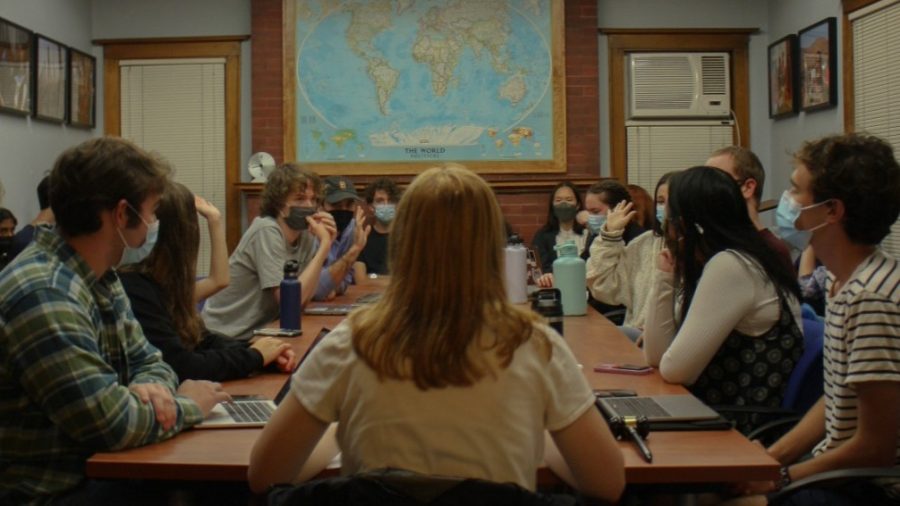Northwestern Political Union votes in favor of canceling student loan debt
Daily file photo by Rebecca Shaid
An October Political Union meeting. A majority of attendees at Monday night’s debate voted in favor of student loan forgiveness.
January 11, 2022
Students at Northwestern’s Political Union narrowly voted in favor of canceling student loan debt by any theoretical amount at Monday night’s debate.
SESP sophomore Yasmeen Rafee led the argument in support of canceling student loan debt. She said doing so would stimulate the U.S. economy, improve the quality of life for many Americans and advance racial justice.
Rafee also argued student loan cancellation would impact low-income college students the most, citing the Biden administration’s proposed $10,000 student loan forgiveness amount.
“Debt cancellation for low-income borrowers as a share of their income is much higher than for wealthier individuals,” Rafee said. “Therefore, the benefits to lower income households would come almost entirely in that $10,000 reduction in loan principal.”
Arguing against loan forgiveness, Weinberg sophomore Will Pattie compared student loan debt cancellation to an ineffective welfare program. He said people without college degrees are often poorer than college graduates and therefore are more in need of federal assistance.
Pattie added the government should focus on funding programs that both have higher amounts of legislative support and are better at supporting those exhibiting the most financial need.
“If we really want to have upward mobility of people at the bottom echelon of society, then it’s pretty important … to give them the support they need so they can go to college in the first place,” Pattie said. “Merely just canceling all student debt … doesn’t incentivize any more people to come to college.”
While nine individuals voted in support of Pattie’s argument, 12 agreed with Rafee. Some also concurred that canceling student loan debt would bolster the economy. Weinberg freshman Jamie Gall said decreasing student loan debt would allow college graduates to make more money, pay more taxes and, in turn, provide more capital to lower income individuals.
Students at the meeting also considered other aspects of the student loan debt crisis.
Weinberg freshman Parker Stava said completely canceling student loan debt could add to the U.S. deficit and contribute to inflation. Offering a modified proposal to Rafee’s plan, Stava suggested a stagnation or lowering of rising interest rates that result in higher student loan defaults.
“Because these interest rates are rising so much that people are only able to pay off the interest, they’re only ever so slightly breathing above the water and they’re not actually floating on top of it,” Stava said.
Another alternative proposal discussed focused student loan cancellation on marginalized communities and those most impacted by student loan debt.
While Rafee said she was compelled by this argument, she added the welfare cliff tends to exclude middle-class individuals who need just as much financial support in this arena. She said middle class citizens are often not seen as a priority when it comes to economic welfare programs, and having a college degree does not equate to financial stability.
In her closing statement, Rafee said her ultimate goal is to make student debt cancellation immediate.
“The (alternative) solutions proposed were ones with this idea of thinking about the long term,” Rafee said. “I’m trying to address the issue that we have right now, which is that people are literally going to default and … put their houses in foreclosure because they cannot afford (to pay off) their student loans.”
Email: [email protected]
Twitter: @swarthout_iris
Related Stories:
— Political Union majority votes industrialization has been good for humanity
— Should journalists remain strictly objective? Political Union majority votes yes
— Noam Chomsky talks climate change, labor rights and free speech at Political Union event


